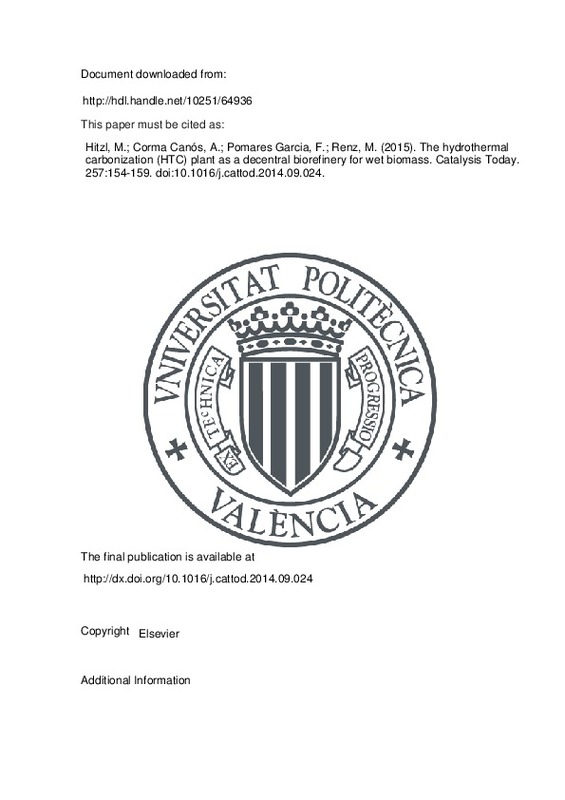JavaScript is disabled for your browser. Some features of this site may not work without it.
Buscar en RiuNet
Listar
Mi cuenta
Estadísticas
Ayuda RiuNet
Admin. UPV
The hydrothermal carbonization (HTC) plant as a decentral biorefinery for wet biomass
Mostrar el registro sencillo del ítem
Ficheros en el ítem
| dc.contributor.author | Hitzl, Martin
|
es_ES |
| dc.contributor.author | Corma Canós, Avelino
|
es_ES |
| dc.contributor.author | Pomares Garcia, Fernando
|
es_ES |
| dc.contributor.author | Renz, Michael
|
es_ES |
| dc.date.accessioned | 2016-05-30T12:24:26Z | |
| dc.date.available | 2016-05-30T12:24:26Z | |
| dc.date.issued | 2015-11-15 | |
| dc.identifier.issn | 0920-5861 | |
| dc.identifier.uri | http://hdl.handle.net/10251/64936 | |
| dc.description.abstract | [EN] The hydrothermal carbonization (HTC) is a very suitable process to transform wet biomass feedstocks into a peat-like material without drying the biomass input. Therefore, the energetic balance is more favorable than for alternative processes converting biomass as a whole. Further synergies can be achieved when the plant is employed as central hub for a regional biorefinery. Hence, a HTC pilot plant is operated with garden prunings and monitored during two years. It is shown that the elemental composition of HTC carbon is relatively constant. A carbon content of higher than 60% (based on dry, ash-free matter) is achieved. Fixed carbon content and volatile matter show low variation being the volatile content quite high with 61% on average. Dried in a post-process treatment which is less energy-demanding than drying of the raw biomass and pressed into pellets or briquettes the HTC carbon can be used as solid biofuel fulfilling the European standard (EN 14961-6). With a regional thermal valorization of the biofuel the ashes can be returned as phosphorous source to the crop land from which the biomass was harvested. Part of the process water, which involves a high amount of potassium, can be used for crop irrigation. In this way, valuable plant nutrients are recovered for soil remediation. Hence, closing the nutrient cycles a HTC plant can be considered as a sustainable local biorefinery producing a solid biofuel. Thereby, solar energy is exploited which was fixed before by photosynthesis together with the carbon dioxide which is liberated in the combustion of the solid biofuel. Optionally, the process water might serve as an alternative source of energy as it is demonstrated that its carbon content can be exploited for biogas production | es_ES |
| dc.description.sponsorship | Authors are grateful for financial support obtained from the Spanish Ministry of Economy and Competitiveness (Innpacto Programme, IPT-2012-0023-120000) and the European Union (FP7-SME-2013-605178-NEW APP). | en_EN |
| dc.language | Inglés | es_ES |
| dc.publisher | Elsevier | es_ES |
| dc.relation.ispartof | Catalysis Today | es_ES |
| dc.rights | Reserva de todos los derechos | es_ES |
| dc.subject | Biogas | es_ES |
| dc.subject | Biomass | es_ES |
| dc.subject | Carbonization | es_ES |
| dc.subject | Phosphorous | es_ES |
| dc.subject | Plant nutrient | es_ES |
| dc.subject | Potassium | es_ES |
| dc.subject | Solid biofuel | es_ES |
| dc.subject.classification | QUIMICA INORGANICA | es_ES |
| dc.subject.classification | QUIMICA ORGANICA | es_ES |
| dc.title | The hydrothermal carbonization (HTC) plant as a decentral biorefinery for wet biomass | es_ES |
| dc.type | Artículo | es_ES |
| dc.identifier.doi | 10.1016/j.cattod.2014.09.024 | |
| dc.relation.projectID | info:eu-repo/grantAgreement/MINECO//IPT-2012-0023-120000/ES/Métodos de extracción y evaluación de bioquímicos, obtenidos en el proceso industrial de carbonización hidrotermal de Ingelia a partir de diferentes tipos de biomasas, y mediante ensayos en la planta prototipo de Ingelia./ | es_ES |
| dc.relation.projectID | info:eu-repo/grantAgreement/EC/FP7/605178/EU/New technological applications for wet biomass waste stream products/ | |
| dc.rights.accessRights | Abierto | es_ES |
| dc.contributor.affiliation | Universitat Politècnica de València. Departamento de Química - Departament de Química | es_ES |
| dc.contributor.affiliation | Universitat Politècnica de València. Instituto Universitario Mixto de Tecnología Química - Institut Universitari Mixt de Tecnologia Química | es_ES |
| dc.description.bibliographicCitation | Hitzl, M.; Corma Canós, A.; Pomares Garcia, F.; Renz, M. (2015). The hydrothermal carbonization (HTC) plant as a decentral biorefinery for wet biomass. Catalysis Today. 257:154-159. https://doi.org/10.1016/j.cattod.2014.09.024 | es_ES |
| dc.description.accrualMethod | S | es_ES |
| dc.relation.publisherversion | http://dx.doi.org/10.1016/j.cattod.2014.09.024 | es_ES |
| dc.description.upvformatpinicio | 154 | es_ES |
| dc.description.upvformatpfin | 159 | es_ES |
| dc.type.version | info:eu-repo/semantics/publishedVersion | es_ES |
| dc.description.volume | 257 | es_ES |
| dc.relation.senia | 302546 | es_ES |
| dc.identifier.eissn | 1873-4308 | |
| dc.contributor.funder | Ministerio de Economía y Competitividad | |
| dc.contributor.funder | European Commission |







![[Cerrado]](/themes/UPV/images/candado.png)

